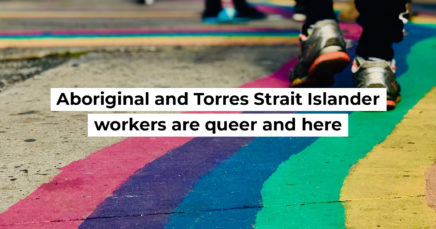The report released today has found that the remote aspect of the Turnbull Government’s controversial program is racially discriminating, punitive, ineffective and expensive compared to the metropolitan program.
A new report by the Australia Institute has slammed the Community Development Program (CDP), also known as ‘work for the dole’, which costs $360 million per year.
The report has labelled the remote Community Development Program racist, incredibly punitive, ineffective, and expensive.
“People are forced into 25 hours worth of labour a week, 5 days a week. They’re excluded from the fair work act, they’re not employees,” ACTU National Campaign Coordinator, Kara Keys told NITV News.
“They’re workers doing jobs where in any other part of the country you’d be getting paid for that work. Under this program, the workers don’t get paid. They get no superannuation, they get no conditions of employment that we would expect anywhere else in the country.
“They’re also excluded from other really important things like occupational health and safety law at a federal level, and also workers compensation. There are very little avenues for workers to go to if they’re hurt on the job when they’re working under the program.”
According to the report, fewer than 10% of CDP workers are supported into a job that they stay in for 6 months each year, and on average a CDP worker would have to stay in the system for 12.7 years to achieve a 26-week placement.
In addition, participants earn just $11 an hour; coupled with the cashless welfare card in some locations, it’s detrimental to remote communities.
“The CDP is causing people to go hungry, costs more than any comparable program and does not achieve its stated goals. The creation and pig-headed defence of this disastrous policy by the Turnbull Government has done lasting damage to countless remote communities who have been robbed of their autonomy,” Ms Keys said.
“This program needs to be scrapped, and replaced with a model which puts economic autonomy in the hands of Indigenous people. The CDP’s paternalistic approach has clearly failed and is causing serious harm.”
Ms Keys also said she was disappointed in the reaction to CDP criticism by Indigenous Affairs Minister Nigel Scullion.
“I’m actually quite concerned with Minister Scullion’s response. To continue to promote the program as working, to continue to promote that it has positive outcomes in communities, it just flies in the face of the evidence, and the evidence is really stacking up,” she said.
“There’s been a Senate inquiry, there’s been a number of reviews to the program, there’s even been the Government’s own audit office review the program and say it’s failing.
“The Minister continues to say that it’s working. He’s either not listening or he’s morally bankrupt in saying something that’s failing is actually working.”
Reported By Madeline Hayman-Reber
Community Development Program ‘racist, punitive, and expensive’, report says | NITV (sbs.com.au)
Source: NITV News



